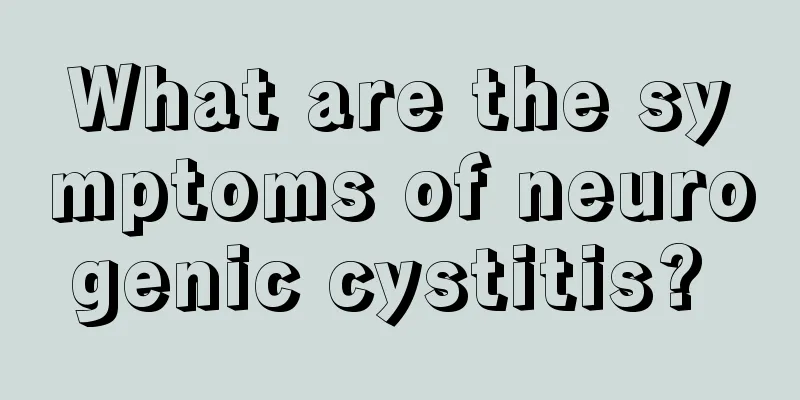What are the symptoms of neurogenic cystitis?

|
The health of the urinary tract is a vital part of people's body, because the urinary tract includes organs such as the bladder and kidneys, which is a highly related system. Urinary tract diseases are an important factor affecting people's health. For example, neurogenic cystitis is a relatively rare disease that has a great impact on patients. Let's take a look at the symptoms of neurogenic cystitis. The bladder is highly resistant to bacteria. It is also difficult for bacteria to enter the bladder, and even if they do, they will be excreted from the body with urine and will not cause infection. However, when there is an upper urinary tract infection, lower urinary tract obstruction, or reduced bladder resistance, the bladder mucosa is easily infected, which can damage the nerves, cause bladder dysfunction, and lead to symptoms of neurogenic cystitis such as spasms. Clinical manifestations 1. Urogenital system symptoms (1) Lower urinary tract symptoms: including urinary urgency, frequent urination, nocturia, urinary incontinence, enuresis, dysuria, incomplete bladder emptying, urinary retention and dysuria. (2) Symptoms of sexual dysfunction: sensitivity in the genital area, erectile dysfunction, abnormal orgasm, abnormal ejaculation, decreased libido, etc. 2. Other symptoms In addition to urination symptoms, there may be intestinal symptoms, nervous system symptoms, etc.: constipation, fecal incontinence, decreased or loss of perineal sensation, limb paralysis, etc. 3. Non-surgical treatment (1) Catheterization Whether for the purpose of promoting urine storage or urination, intermittent catheterization can effectively treat neuromuscular urination dysfunction, avoid the pain of long-term catheterization or even suprapubic cystostomy, and create conditions for further treatment (bladder augmentation, continent urinary diversion). (2) Auxiliary treatment: ① Empty the bladder regularly; ② Pelvic floor muscle training; ③ Training the "trigger point" for urination; ④ Use of an external urine collection device for men. (3) Drug treatment ① Drugs for treating detrusor overactivity, such as M receptor blockers. ②Drugs for treating detrusor muscle weakness, M receptor agonists. ③Drugs that reduce bladder outlet resistance, such as α-receptor blockers. ④Drugs that increase bladder outlet resistance: α receptor agonists. ⑤Drugs that reduce urine production, such as desmopressin. ⑥Other drugs. (4) Acupuncture therapy: Acupuncture is effective in treating sensory paralysis bladder caused by diabetes, especially in the early stages of the disease. |
<<: What are the symptoms of neuromuscular pain?
>>: Is there any specific medicine for neuralgic toothache?
Recommend
What are the more obvious symptoms of lung cancer? These symptoms of lung cancer are more common
Because the early symptoms of lung cancer are not...
How is radiotherapy for liver cancer? What are the limitations of radiotherapy for liver cancer?
Since the early 1920s, foreign countries have beg...
What are the 9 common types of lymphoma?
Lymphoma originates from the lymphatic tissue of ...
What are the precautions for dentures
We all know that once there is a problem with tee...
What are the local symptoms of lymphoma
Lymphoma, also known as "lymphoma", is ...
What should I do if it hurts when walking on a cracked athlete's foot?
There are many symptoms of athlete's foot, su...
What are the hazards caused by testicular cancer
Most patients with testicular cancer do not have ...
Seasonal health care, what foods are there to nourish the liver in spring
The role of the liver in the human body is self-e...
What does sweatshirt mean
Sweatshirt mainly comes from the pronunciation of...
Poorly differentiated gastric cancer infection
Poorly differentiated gastric cancer infection Th...
Pituitary tumor recurrence rate
Tumors are a common symptom in the body structure...
What long-acting medicine should I take for high blood pressure
Many people suffer from high blood pressure, whic...
Stockholm Symptoms
The strange phenomenon of Stockholm syndrome is o...
It turns out that there are 5 aspects of postoperative care for esophageal cancer
As we all know, esophageal cancer is extremely ha...
What are the pathological diagnostic methods for lung cancer
What are the pathological diagnosis methods for l...









